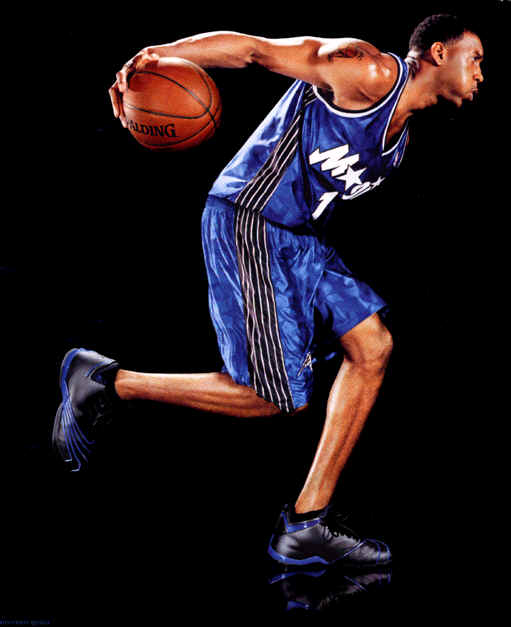Not necessarily. If you have a long lower leg, you could have both, relative to other people. Yepishin doesn’t have long legs or a long lower limb AND has big ass calves.
Oh ok, so the length of the calf or achilles isn’t relative, you’re talking absolute. Surely then that would give taller sprinters an immediate advantage as they are likely to have longer legs?? Say Obikwelu who is tall with long limbs must have an immediate advantage over someone like Greene who is a good 6 inches shorter. Just thought, Darrel Brown. Long calves???
I don’t know. It is hard to say. If you look at coby miller, his achilles does not look short by any means, but he does have large calves. Would taller sprinters have an advantage? Hard to say, but we have to remember that being taller may not be the best for acceleration, but may aid in top speed and speed endurance. We also have to take into consideration, physically, the muscular differences.
Someone please dump some photos on here. We have 50 pictures of asses, dorsiflexion…
How do you know how long your achilles is without an X-ray or ultrasound?
Usually where your calf insertion is will give you a pretty darn good idea. Look at the pictures I posted to see the basic diff.
Lol. WHAT pictures?
Neither of those links work for me.
On average people of african origin have longer achilles tendons… It’s easy enough to find Caucasian examples of short achilles, I can’t think of any African examples of short achilles.
Check out this link… it’s not sprint specific but shows good research on achilles length.
http://www.sportsinjurybulletin.com/archive/achilles-tendon.html
Yeah I get what you’re saying. I would guess the best way to look at it would be relative to height, or at least leg length, otherwise height is not be accounted for. I think it’s a better way to objectify it. In terms of height I would agree it benefits the later parts of a race, and vice versa.
Lower leg length is apparently a desirable quality in a sprinter… although long legs as a whole should create good leverage.
http://www.sportsinjurybulletin.com/archive/achilles-tendon.html
quotes from the above article…
It follows that if your Achilles tendons get even better at returning energy, your economy should improve and your race times should slim down, too. But what separates great Achilles tendons from shabby ones? To find out, the Danes studied a group of young athletes and found that if an athlete has Achilles tendons which are about 10-per cent shorter than average, mechanical efficiency (economy) is hurt by about 6 per cent. On the other hand, if the Achilles tendons are 1 per cent longer than average, economy is enhanced by 8 per cent!
The Copenhagen researchers also noted that thick Achilles tendons were bad for economy, although the effects weren’t quite as pronounced: thickening the Achilles tendons by 10 per cent harmed economy by about 4 per cent, for example, while thinning the strange things assisted economy by 3 per cent.
Interesting article. Again it doesn’t say, or that summary doesn’t say, how the achilles length was determined and whether it was relative or absolute.
i skimmed the article and at the end it loses all credibility “stretch out that achilles tendon” as if you can change the length of the achilles in a beneficial way with out resulting in joint laxity.
All the other sources i’ve read on the subject say achilles length is genetic and can’t be changed.
The above article is the only one that may suggest otherwise.
I know you can have an operation to lengthen the achilles (for tight achilles-injuries).
I wonder if this operation would be benifitial to sprinting (in the long run) and whether it would be classed as cheating???
I don’t care if they are mechanically sound or not (what is the criteria btw?) i look for the injury rate and the PB and medals won. If these 3 area, which can be objectived, as safe, then they are mechanically sound. Trevor Graham cannot complain on these 3 area. Dan Pfaff neither, but isn’t Pfaff who called Bailey “the world’s fastest duck”?
I wasn’t criticising Pfaff or Graham’s training or coaching at all. I was just saying the athlete’s I mentioned didn’t have the most aesthetically pleasing technique. That’s it. Several of Pfaff’s athletes did in my opinion, have very sound mechanics. I’m disputing how successful these athletes were, afterall the best way to judge that is, like you say, PB and medals.
ok time to revive this for a bit. is it length of achilles relative to height or just length? so, would a taller sprinter with say a 20cm achilles (just an example) that is relatively short have an advantage over a short sprinter with a 15 cm achilles that is relatively long, with all other things being equal.
I would imagine relativity is the key. It’s the same with leg length, bodyfat %, etc.
Narrow hips would be a bigger factor than length of achilles.
why? what do they help with? and what would narrow hips be?
